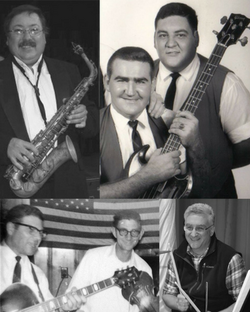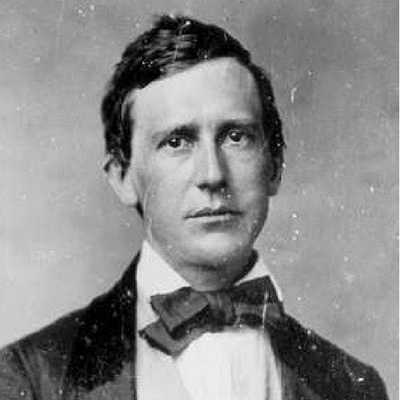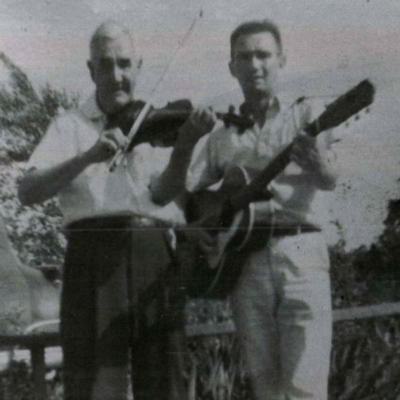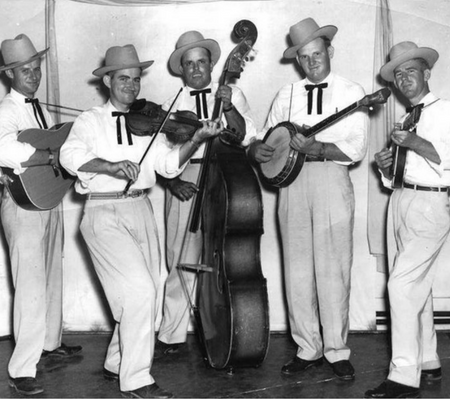The Congiardo Family
Musicians & Music Educators

As Read by Ronnie Brooks, McNairy County Mayor
June 13, 2014
In West Tennessee, the name “Congiardo” is synonymous with quality band programs. Whether it’s at Selmer High School, Adamsville Jr./Sr. High School, McNairy Central, Madison Academic, or a host of other schools where their influence has been felt, the Congiardo family has established a reputation for building and sustaining the highest level of music education programs available anywhere. Indeed, they are legendary for it and that is no overstatement. Significant as it is, that is only part of their story. Congiardos spanning at least four generations have been part of the fabric of the local music scene for as long as anyone can remember. To some, they are known only by reputation but here in McNairy County the Congiardo family’s roots are deep and they are regarded as dear friends, neighbors, and of course, musical mentors. The local lives they have touched through music and friendship must literally number deep into the thousands by now. Again no exaggeration needed, that’s just the plain truth of it. Frank Jr., Dominic, Frankie and Michael Congiardo—two generations, two sets of brothers bearing the same name—have made an indelible mark on the culture of McNairy County with their gift of music. This is no secret to anyone, but what some may not realize is that the family’s musical odyssey begins a generation earlier with another Frank.
Frank Congiardo Senior was born into household filled with music in Illinois but would later relocate to Ramer, TN. Everybody in the Congiardo family played something. By the time he was five years old Frank Senior was playing mandolin in a family band with his father and brothers who had obviously encouraged his interest in music at a very early age. As the young man’s musical interests grew and changed he picked up and became skilled at a variety of other instruments including fiddle, bass fiddle and guitar. He would retain an interest in mandolin throughout his life but regarded guitar as his primary instrument and established a reputation as one of the best players around. In addition to his interest in a variety of instruments, Frank Senior had wide ranging taste in music and could play virtually any style. It was more than a pastime, he took it more seriously than any of his forbearers, fronting big bands, jazz combos, country, old time, and pop groups, and—with a nod to tomorrows proceedings—even a rockabilly band or two. The various outfits played most every weekend at every conceivable kind of gig from house parties to music clubs and everything in between. But perhaps his most proud musical achievement—and certainly the one we are most grateful for—was in passing his love of music on to the next generation. Just as his father had done, Frank Senior encouraged his family to play music at every available opportunity. And boy would the next generation of Congiardos ever catch the music fever.
Frank Congiardo Junior learned to play piano from his mother at the age of 5 and by 14 was already playing saxophone in his father’s bands around the area. A gifted multi-instrumentalist, he would continue to play music throughout his life in a variety of settings including community bands in McNairy, Alcorn and Madison counties where he often had the opportunity to play with his brother and sons—more on them later. It was often observed that Frank Jr. could have played professionally had he so desired and he was certainly a shrewd enough judge of musical talent to have known that, but as a young man he discovered a second passion which would extend his influence even farther than a career in the music industry. Not only could he play, Frank Jr. had a gift for teaching music which he would exercise throughout a long career as a band director first at Selmer High School and later at McNairy Central and Adamsville. The thousands of kids who came through Frank’s McNairy County bands learned more than music. They learned, discipline, perseverance, teamwork, commitment, and leadership. They learned to love music and more importantly to respect the qualities it takes to become a good musician. These lessons would serve them well in life no matter what career path they chose, but especially if they became musicians or educators. The number of students, including Frank’s two sons, who followed his example to become music educators, is nothing short of phenomenal. Countless kids, who may not even know his name, owe a quality music education to Frank Congiardo Junior.
One student who certainly knew his name was younger brother Dominic who entered the 5th grade at Selmer Junior High School as a band student. The band director was none other than Frank Jr. Dominic had followed in his older brother’s footsteps, first learning to play piano at home, playing in the various bands with family members, eventually picking up the saxophone as his primary instrument. Where Frank had chosen music education as a career path, Dominic moved to Memphis at age 19 to pursue a career as a professional musician. There he added flute to the list of instruments he could play at the professional level and was soon in demand as a club, studio and touring musician. Dominic enjoyed a long career playing, recording and touring with the likes of the Allman Brothers Band, the Doobie Brothers, and Hank William’s Jr. with whom he earned a Gold Record. His touring and recording days put him in the circle of music industry elites and he numbered among his friends and contacts, the members of Lynyrd Skynyrd Band, Jefferson Airplane and even Cher. Not too shabby for a McNairy County boy. Never one to brag or name drop, these facts had to be coaxed out of Dominic, who remained the consummate yet humble music professional throughout his career.
The next generation of Congiardo’s would be no less impressive. Frank Juniors two sons, Frank III and Michael Todd (or just plain Mike to most of us) continued the legacy of excellence in music education. Mike began playing saxophone in the 5th grade with another family connection as a mentor. Greg Stover was the band director at Selmer Junior High and would in time become Mike’s uncle. Like the generations before him Mike demonstrated a keen interest and an ear for music at an early age and developed under the watchful eyes of Greg and Frank Junior who became his band director in High School. A gifted performer in his own right, Mike earned an undergraduate degree in Music Education and a Masters in Music Performance with a concentration on Saxophone, of course. These prepared him to follow in the footsteps of his father, brother and uncle to become a well known and respected band director at Gibson County High School and Madison Academic Magnet School. His programs which included marching, jazz and symphonic bands consistently earned superior ratings in performance at state concert festivals and in the case of Gibson County a Division II State Championship title. One of his former students summed his career up pretty well when he said, “Mr. C was a well respected band director, saxophone player, mentor, motivator, counselor, and developer of musical talent, but most of all, Mr. C was a friend.” Mike’s career was cut short just earlier this year but there is no doubt that he lives on in the lives and music of all the students he touched in an unparalleled career as a music educator and yes, a fantastic friend.
That brings us finally to Mike’s older brother Frankie. Samuel Frank Congiardo has just announced his retirement after 29 years as the band director at Adamsville Jr./Sr. High School. What a ride it has been. By what has already been observed everyone here will know that, by virtue of his genetics, Frankie is a supremely talented musician—he’s arguably the best percussionist the county has ever produced—so let’s cut right to the chase. In his tenure as director of the Adamsville band, the program has eared 8 Division I State Championship titles, never finishing lower than 2nd place in the last ten years. This makes Frankie, hands down, the most highly decorated band director in McNairy County history and indeed one of the most successful music educators the state of Tennessee has ever known by anyone’s standard. The legacy of excellence and dedication he leaves behind is more than remarkable and it extends well beyond the world of music. Rarely, in any field, has anyone so distinguished themselves and brought such positive attention to their school, town and county. To borrow an old local phrase, Adamsville has “the biggest little band in Tennessee.” Perhaps Adamsville city administrator Steve Simon said it best when presenting Frankie with the 2012 MRA professional achievement award, “If a football coach had won 8 State titles,” he said, “they would have built a monument to him on the courthouse lawn.” Well observed. And yet, Frankie still persists in giving credit to his family and others who mentored him in music. “I am very fortunate to have been influenced by my family members throughout my career,” he said. “No new director entering the field could have had more outstanding mentors. Glen Gately, Dwight Porter, Nancy Matheson, Donald Anthony and, of course my father, Frank Congiardo Junior and uncle Greg Stover inspired me to find my place in the world of music. No one could have had a better musical life, career, and experience than I have had.” I think we can all agree on that.
In preparing the remarks for this induction, a common theme emerged from the lives of each man mentioned: just how much they all loved to play music with their family and friends. In various combinations and at various times, one generation mentored and inspired the next to become the best musicians and best people they could be. Proud moments were shared, like Frank Senior having the opportunity to hear his sons and grandsons play together for the first time; Frank Junior getting to play with both his sons in the Jackson area Community Jazz Band; and Frankie making music with his father, children, and several former students in the Arts in McNairy Community Band. This commitment to share and pass music along through their family came quite naturally to them but it is perhaps the single most important factor which causes us to recognize them here tonight. You see, even though we speak of their accomplishments in historic terms, we understand that this is a living legacy which is far from complete. Frankie’s children Zach and Darby continue the legacy of musical excellence in their generation and who knows where their musical journey will lead? Similarly, countless students who have been inspired and encouraged by the Congiardos are making music and passing it on, somewhere, even as we speaking. It is truly hard to overstate the positive impact this one family has made—and continues to make—on the musical heritage of our county, state and yes, even our world.
It is with gratitude and great pride I induct the Congiardo Family into the McNairy County Music Hall of Fame.
June 13, 2014
In West Tennessee, the name “Congiardo” is synonymous with quality band programs. Whether it’s at Selmer High School, Adamsville Jr./Sr. High School, McNairy Central, Madison Academic, or a host of other schools where their influence has been felt, the Congiardo family has established a reputation for building and sustaining the highest level of music education programs available anywhere. Indeed, they are legendary for it and that is no overstatement. Significant as it is, that is only part of their story. Congiardos spanning at least four generations have been part of the fabric of the local music scene for as long as anyone can remember. To some, they are known only by reputation but here in McNairy County the Congiardo family’s roots are deep and they are regarded as dear friends, neighbors, and of course, musical mentors. The local lives they have touched through music and friendship must literally number deep into the thousands by now. Again no exaggeration needed, that’s just the plain truth of it. Frank Jr., Dominic, Frankie and Michael Congiardo—two generations, two sets of brothers bearing the same name—have made an indelible mark on the culture of McNairy County with their gift of music. This is no secret to anyone, but what some may not realize is that the family’s musical odyssey begins a generation earlier with another Frank.
Frank Congiardo Senior was born into household filled with music in Illinois but would later relocate to Ramer, TN. Everybody in the Congiardo family played something. By the time he was five years old Frank Senior was playing mandolin in a family band with his father and brothers who had obviously encouraged his interest in music at a very early age. As the young man’s musical interests grew and changed he picked up and became skilled at a variety of other instruments including fiddle, bass fiddle and guitar. He would retain an interest in mandolin throughout his life but regarded guitar as his primary instrument and established a reputation as one of the best players around. In addition to his interest in a variety of instruments, Frank Senior had wide ranging taste in music and could play virtually any style. It was more than a pastime, he took it more seriously than any of his forbearers, fronting big bands, jazz combos, country, old time, and pop groups, and—with a nod to tomorrows proceedings—even a rockabilly band or two. The various outfits played most every weekend at every conceivable kind of gig from house parties to music clubs and everything in between. But perhaps his most proud musical achievement—and certainly the one we are most grateful for—was in passing his love of music on to the next generation. Just as his father had done, Frank Senior encouraged his family to play music at every available opportunity. And boy would the next generation of Congiardos ever catch the music fever.
Frank Congiardo Junior learned to play piano from his mother at the age of 5 and by 14 was already playing saxophone in his father’s bands around the area. A gifted multi-instrumentalist, he would continue to play music throughout his life in a variety of settings including community bands in McNairy, Alcorn and Madison counties where he often had the opportunity to play with his brother and sons—more on them later. It was often observed that Frank Jr. could have played professionally had he so desired and he was certainly a shrewd enough judge of musical talent to have known that, but as a young man he discovered a second passion which would extend his influence even farther than a career in the music industry. Not only could he play, Frank Jr. had a gift for teaching music which he would exercise throughout a long career as a band director first at Selmer High School and later at McNairy Central and Adamsville. The thousands of kids who came through Frank’s McNairy County bands learned more than music. They learned, discipline, perseverance, teamwork, commitment, and leadership. They learned to love music and more importantly to respect the qualities it takes to become a good musician. These lessons would serve them well in life no matter what career path they chose, but especially if they became musicians or educators. The number of students, including Frank’s two sons, who followed his example to become music educators, is nothing short of phenomenal. Countless kids, who may not even know his name, owe a quality music education to Frank Congiardo Junior.
One student who certainly knew his name was younger brother Dominic who entered the 5th grade at Selmer Junior High School as a band student. The band director was none other than Frank Jr. Dominic had followed in his older brother’s footsteps, first learning to play piano at home, playing in the various bands with family members, eventually picking up the saxophone as his primary instrument. Where Frank had chosen music education as a career path, Dominic moved to Memphis at age 19 to pursue a career as a professional musician. There he added flute to the list of instruments he could play at the professional level and was soon in demand as a club, studio and touring musician. Dominic enjoyed a long career playing, recording and touring with the likes of the Allman Brothers Band, the Doobie Brothers, and Hank William’s Jr. with whom he earned a Gold Record. His touring and recording days put him in the circle of music industry elites and he numbered among his friends and contacts, the members of Lynyrd Skynyrd Band, Jefferson Airplane and even Cher. Not too shabby for a McNairy County boy. Never one to brag or name drop, these facts had to be coaxed out of Dominic, who remained the consummate yet humble music professional throughout his career.
The next generation of Congiardo’s would be no less impressive. Frank Juniors two sons, Frank III and Michael Todd (or just plain Mike to most of us) continued the legacy of excellence in music education. Mike began playing saxophone in the 5th grade with another family connection as a mentor. Greg Stover was the band director at Selmer Junior High and would in time become Mike’s uncle. Like the generations before him Mike demonstrated a keen interest and an ear for music at an early age and developed under the watchful eyes of Greg and Frank Junior who became his band director in High School. A gifted performer in his own right, Mike earned an undergraduate degree in Music Education and a Masters in Music Performance with a concentration on Saxophone, of course. These prepared him to follow in the footsteps of his father, brother and uncle to become a well known and respected band director at Gibson County High School and Madison Academic Magnet School. His programs which included marching, jazz and symphonic bands consistently earned superior ratings in performance at state concert festivals and in the case of Gibson County a Division II State Championship title. One of his former students summed his career up pretty well when he said, “Mr. C was a well respected band director, saxophone player, mentor, motivator, counselor, and developer of musical talent, but most of all, Mr. C was a friend.” Mike’s career was cut short just earlier this year but there is no doubt that he lives on in the lives and music of all the students he touched in an unparalleled career as a music educator and yes, a fantastic friend.
That brings us finally to Mike’s older brother Frankie. Samuel Frank Congiardo has just announced his retirement after 29 years as the band director at Adamsville Jr./Sr. High School. What a ride it has been. By what has already been observed everyone here will know that, by virtue of his genetics, Frankie is a supremely talented musician—he’s arguably the best percussionist the county has ever produced—so let’s cut right to the chase. In his tenure as director of the Adamsville band, the program has eared 8 Division I State Championship titles, never finishing lower than 2nd place in the last ten years. This makes Frankie, hands down, the most highly decorated band director in McNairy County history and indeed one of the most successful music educators the state of Tennessee has ever known by anyone’s standard. The legacy of excellence and dedication he leaves behind is more than remarkable and it extends well beyond the world of music. Rarely, in any field, has anyone so distinguished themselves and brought such positive attention to their school, town and county. To borrow an old local phrase, Adamsville has “the biggest little band in Tennessee.” Perhaps Adamsville city administrator Steve Simon said it best when presenting Frankie with the 2012 MRA professional achievement award, “If a football coach had won 8 State titles,” he said, “they would have built a monument to him on the courthouse lawn.” Well observed. And yet, Frankie still persists in giving credit to his family and others who mentored him in music. “I am very fortunate to have been influenced by my family members throughout my career,” he said. “No new director entering the field could have had more outstanding mentors. Glen Gately, Dwight Porter, Nancy Matheson, Donald Anthony and, of course my father, Frank Congiardo Junior and uncle Greg Stover inspired me to find my place in the world of music. No one could have had a better musical life, career, and experience than I have had.” I think we can all agree on that.
In preparing the remarks for this induction, a common theme emerged from the lives of each man mentioned: just how much they all loved to play music with their family and friends. In various combinations and at various times, one generation mentored and inspired the next to become the best musicians and best people they could be. Proud moments were shared, like Frank Senior having the opportunity to hear his sons and grandsons play together for the first time; Frank Junior getting to play with both his sons in the Jackson area Community Jazz Band; and Frankie making music with his father, children, and several former students in the Arts in McNairy Community Band. This commitment to share and pass music along through their family came quite naturally to them but it is perhaps the single most important factor which causes us to recognize them here tonight. You see, even though we speak of their accomplishments in historic terms, we understand that this is a living legacy which is far from complete. Frankie’s children Zach and Darby continue the legacy of musical excellence in their generation and who knows where their musical journey will lead? Similarly, countless students who have been inspired and encouraged by the Congiardos are making music and passing it on, somewhere, even as we speaking. It is truly hard to overstate the positive impact this one family has made—and continues to make—on the musical heritage of our county, state and yes, even our world.
It is with gratitude and great pride I induct the Congiardo Family into the McNairy County Music Hall of Fame.


